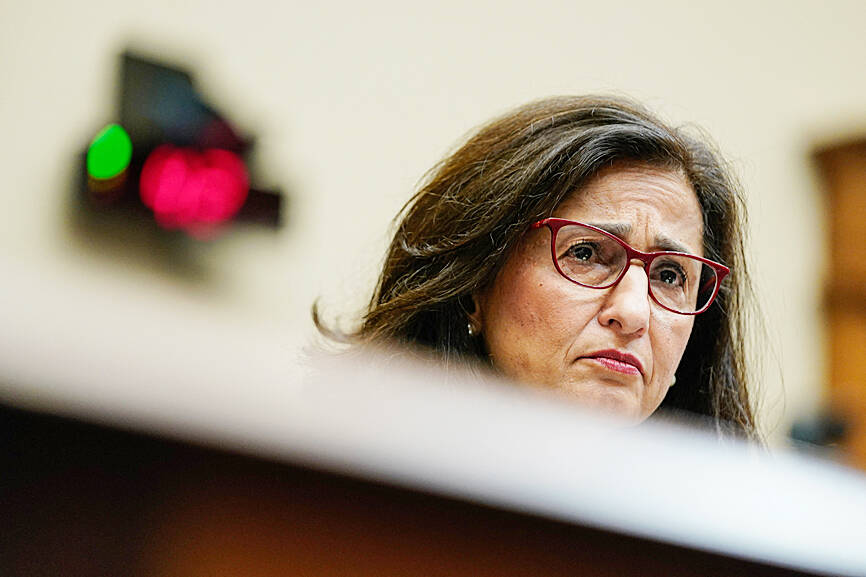Columbia University president Minouche Shafik resigned on Wednesday, nearly four months after the Ivy League university’s handling of campus protests over Israel’s war in Gaza was criticized by pro-Israel and pro-Palestinian sides alike.
“It has also been a period of turmoil where it has been difficult to overcome divergent views across our community,” Shafik said in an e-mail to staff and students. “This period has taken a considerable toll on my family, as it has for others in our community.”
Shafik said her departure “at this point would best enable Columbia to traverse the challenges ahead.”

Photo: AFP
She said she made the announcement so new leadership could be in place before the new term begins.
Columbia was rocked in April and May as protesters occupied parts of the Upper Manhattan campus in opposition to Palestinian civilian deaths in Gaza, resulting in hundreds of arrests. The demonstrators denounced Shafik for calling police onto campus to halt the demonstrations, while pro-Israel supporters castigated her for failing to crack down sufficiently.
Katrina Armstrong, Columbia’s executive vice president for health and biomedical services, would serve as the interim president, according to the university Web site.
US Representative Elise Stefanik from upstate New York, who castigated Shafik and other university leaders in US congressional hearings over Gaza protests nationwide, welcomed her resignation on X, saying it was “overdue” because of her failure to protect Jewish students.
Shafik, an Egyptian-born economist who holds British and US nationality, was previously deputy governor of the Bank of England, president of the London School of Economics and Political Science, and deputy managing director at the IMF.
She became the 20th president of Columbia University in July last year.
After protesters set up dozens of tents and demanded that the university sell its Israeli assets, university officials tried to negotiate an agreement with protesters on dismantling the camps.
As talks failed, Shafik on April 18 took the unusual step of asking New York police to enter the campus, angering many rights groups, students and faculty.
More than 100 people were arrested and the tents were removed from the main lawn, but within a few days, the encampment was back in place. The university called police back in on April 30, when they arrested 300 people at Columbia and the City College of New York.
Shafik then asked police to stay until at least May 17 — two days after graduation — “to maintain order and ensure that encampments are not re-established.”
The current Gaza conflict was triggered on Oct. 7 last year when Palestinian fighters from Hamas attacked Israel, killing 1,200 and taking about 250 hostages, according to Israeli tallies.
Israel’s subsequent assault on the Hamas-governed enclave has since killed about 40,000 Palestinians, according to the local health ministry, while displacing nearly the entire population of 2.3 million, causing a hunger crisis and leading to genocide allegations at the World Court that Israel denies.

‘WIN-WIN’: The Philippines, and central and eastern European countries are important potential drone cooperation partners, Minister of Foreign Affairs Lin Chia-lung said Minister of Foreign Affairs Lin Chia-lung (林佳龍) in an interview published yesterday confirmed that there are joint ventures between Taiwan and Poland in the drone industry. Lin made the remark in an exclusive interview with the Chinese-language Liberty Times (the Taipei Times’ sister paper). The government-backed Taiwan Excellence Drone International Business Opportunities Alliance and the Polish Chamber of Unmanned Systems on Wednesday last week signed a memorandum of understanding in Poland to develop a “non-China” supply chain for drones and work together on key technologies. Asked if Taiwan prioritized Poland among central and eastern European countries in drone collaboration, Lin

The Chien Feng IV (勁蜂, Mighty Hornet) loitering munition is on track to enter flight tests next month in connection with potential adoption by Taiwanese and US armed forces, a government source said yesterday. The kamikaze drone, which boasts a range of 1,000km, debuted at the Taipei Aerospace and Defense Technology Exhibition in September, the official said on condition of anonymity. The Chungshan Institute of Science and Technology and US-based Kratos Defense jointly developed the platform by leveraging the engine and airframe of the latter’s MQM-178 Firejet target drone, they said. The uncrewed aerial vehicle is designed to utilize an artificial intelligence computer

Renewed border fighting between Thailand and Cambodia showed no signs of abating yesterday, leaving hundreds of thousands of displaced people in both countries living in strained conditions as more flooded into temporary shelters. Reporters on the Thai side of the border heard sounds of outgoing, indirect fire yesterday. About 400,000 people have been evacuated from affected areas in Thailand and about 700 schools closed while fighting was ongoing in four border provinces, said Thai Rear Admiral Surasant Kongsiri, a spokesman for the military. Cambodia evacuated more than 127,000 villagers and closed hundreds of schools, the Thai Ministry of Defense said. Thailand’s military announced that

CABINET APPROVAL: People seeking assisted reproduction must be assessed to determine whether they would be adequate parents, the planned changes say Proposed amendments to the Assisted Reproduction Act (人工生殖法) advanced yesterday by the Executive Yuan would grant married lesbian couples and single women access to legal assisted reproductive services. The proposed revisions are “based on the fundamental principle of respecting women’s reproductive autonomy,” Cabinet spokesperson Michelle Lee (李慧芝) quoted Vice Premier Cheng Li-chiun (鄭麗君), who presided over a Cabinet meeting earlier yesterday, as saying at the briefing. The draft amendment would be submitted to the legislature for review. The Ministry of Health and Welfare, which proposed the amendments, said that experts on children’s rights, gender equality, law and medicine attended cross-disciplinary meetings, adding that